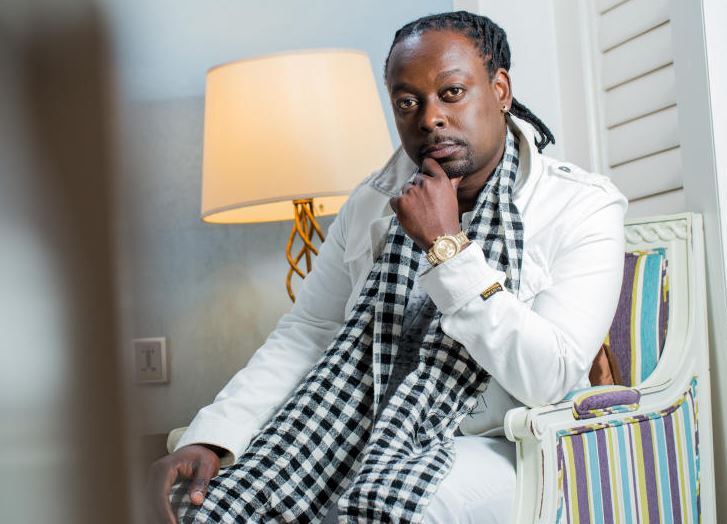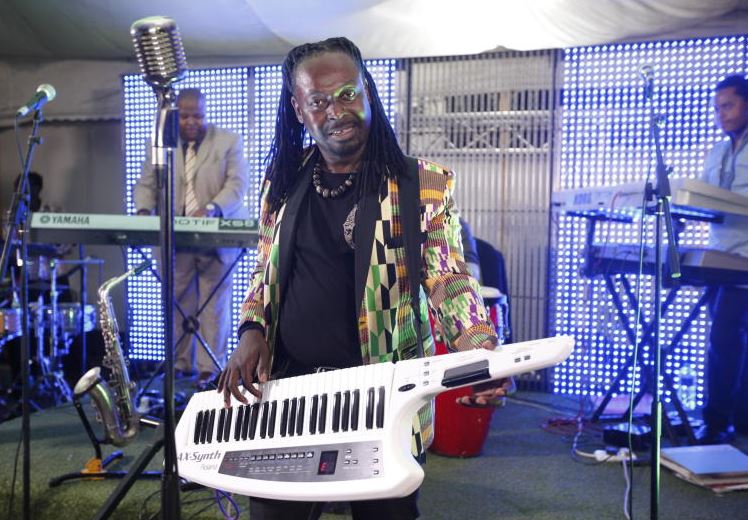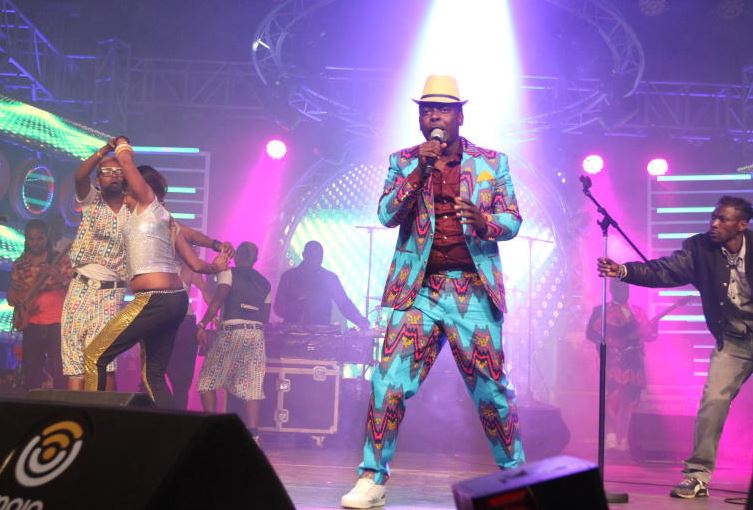
James Jozee, also known as James Gogo, and his keytar are a match made in heaven, so I am disappointed when he doesn’t show up with it, or, at the very least, a saxophone for the interview. A grand piano would be too much to ask, I suppose, but it seems to me that he and the keytar are attached at the hip.
“I love it. The reason I love it is because I am able to play with it, I love dancing and being able to move around,” he says. “My favourite instrument is the upright grand piano but it covers you so you’re not able to interact with people. I’m more free with the keytar.”
His main instrument is the piano, but in addition to singing, he can actually play five instruments – the piano, guitar, saxophone, bass guitar and drums.
The first thing I want to know about him is what his name actually is, because while planning the interview, I was never sure what to call him. Some people call him ‘James Gogo’, some ‘James Jozee’, every once in a while you might even hear someone call him ‘Gogosimo, but that’s the name of his band, which means, ‘hide and seek.’
So over our tea and coffee at a popular restaurant, I finally get to the bottom of it.

Influences
“My real names are Marcus James Jozee,” he says. “James Gogo is my stage name. People started calling me that because of the name of my band, Gogo Simo. So people nicknamed me to become that. It’s like Stevie Wonder.”
“Wonder is not his name?” I ask.
“No it’s not! You can google it. Look for his real name,” he says.
So we do, and what do you know? Stevie Wonder’s original name is Stevland Hardaway Morris, Steveland Judkins or Steveland Morris.
“Yes, like James Gogo,” he says.
It’s a great comparison since Stevie Wonder is one of his biggest influences. It irks him a little that he has no African name.
“I prefer Gogo because it sounds African, since I don’t have an African mame,” he says.
It also irked his other huge musical influence, Hugh Masekhela, who christened him ‘Jemusu’. “He would be like, ‘James? Nooo. Jemusu. Jemusu,” he says, with a Hugh Masekela-esque lilt.
“Were you friends with him?” I ask.
“Very good friends,” he replies. “He told me, ‘James, it’s a journey.’
I had asked him when I was I going to get there?
“He told me ‘don’t give up. You know the people who do pop songs, but they don’t stay long. They’re not legends. If you want to be a legend, you have to be a star that is always there. Not a shooting star. So he told me, ‘Keep on doing what you do, your own music, because your music is what will keep you there. Originality. Not covers and stuff’.”
His biggest influence, however, was his father, renowned Congolese saxophonist Ndongo Amani. James is a Kenyan of mixed heritage.
“I was born in Kibokoni, Mombasa. Near Fort Jesus. I grew up there. My mum was half Malawian, half Gunya from Lamu. My father was half French, half Congolese,” he says. “My mum used to sing. So she really helped me in terms of singing and my dad in terms of saxophone and piano.”
Their large family, five brothers and three sisters, would have fun singing together. His brother, Michael Jozee, plays piano and is a music teacher. His sister Josephine Gouveia is into music too. His four sons aged 21, 20, 15 and 9 are also all musically inclined.
His parents are the reason he started studying music. He used sheet music, unlike many musicians who start out by listening.
“My father used to tell me that education is everything, so you have to learn music theory. A lot of musicians don’t like music theory but it is important. My father really pushed it.” He hilariously recalls the first time he realised one could play by listening.

Playing by the ear
“After my father passed away, I was called to this band. I only knew how to read music because my father had given me a lot of music books. So if I want a song, a jazz standard, I know I have chords here and I can be able to play.
“One band – I will not say which band!” he says with a laugh. “They called me. They were looking for a keyboard player. So I went for practice. And then they gave me a cassette, So I was like, ‘What is this for?’ They said, ‘You listen.’
“‘What? You listen? You don’t have a music sheet for this?’”
“They told me I had to use my ears. I had never done something like that so we just worked on other songs. So when we took a break I told them to let me work on a song ‘Nothing’s Gonna Change My Love for you’. It had a very nice intro. They gave me a cassette but the tape player was bad. It had a delay so you couldn’t actually tell which key the song was in. It was hard. So I shut the piano down, looked outside, saw that they were not there, I shut the door nicely and ran away.”
But his mother explained that you could actually listen to the sound of a song and the chords. He went back and told them he hadn’t been feeling well.
“She taught me how to listen while my father taught me theory,” he says.
Later on, he would join Safari Sound at the end of 1999 when their keyboard player passed away.
“The beginning of my musical journey was when I started performing with Safari Sound.”
He belts out the beginning of a few of their tunes: ‘Pole pole sasa…’ ‘Kenya Safari…’ ‘Malaika…’ ‘Nakupenda…’.
They toured Europe before he formed his own band, Gogosimo, in 2002, alongside his ex-wife; before they parted ways. His marriage is something he does not want to talk about.
He started performing on a cruise ship, Royal Star.
“It was amazing. We visited different islands – I was in Madagascar, Mayotte, Comoros Islands, Seychelles, Mauritious, Misali in Zanzibar, South Africa, Réunion. It was a good experience,” he says.
But what is life on a cruise ship like outside of performing?
“It’s very nice but it’s also very boring because you are in a small world,” he says.
“Like living in a moving hotel you can’t escape from?” I ask
“Exactly. But it’s good because I learnt a lot there. Meditating, knowing yourself.”
Meeting Papa Wemba
He moved to Nairobi in 2007, where he would meet and record with one of his idols, Congolese musician Papa Wemba, by chance. It was one of the biggest highlights of his life. Incidentally, Papa Wemba knew his father very well.
“I think it was 2008. He was going for Mandela’s birthday in South Africa. He was staying in Serena and I was playing piano but I didn’t know he was there. He was having dinner. I played ‘Rail On’ on piano. He came and started singing. ‘Kama we unaenda...’ I was like, ‘Who is this singing?’ It was Papa! I was so excited! After that I didn’t even play piano. We had dinner together.
“He asked who I was and I told him. He said, ‘Jozee of the Jozee I know?’ And he said, ‘Yes, I played with your father!’”
Jozee was working on his Heshima album then, so Papa Wemba said he was going to be staying for two days. “Do you want me to do something?” he recalls Papa Wemba asking.
Jozee agreed. “I didn’t even sleep, I kept waking up,” he says of the excitement. Jozee picked him up the next day and they spent the whole of that day together, listening to Jozee’s album and recording a song with him at Suzanne Gachukia’s studio, Sub-Sahara Studios, formerly known as Samawati studio.
Today, he has about 100 songs and has seven albums under his belt. He describes his music as ‘Afro Smoothy World Music’.
Not jazz? I ask.
“It is jazz,” he says. “When you say ‘world, jazz is in there. Pop is in there. So world music is everything together. It’s a buffet.” In addition to his first influence, his father, Jozee Ndongo Gouveia, Stevie Wonder and Hugh Masekela, his other influences are Oscar Peterson and Mzee Ngala, to mention but a few.
His first albums were Gogo Simo, Upawa, Heshima ft Papa Wemba, Zabibu with Bruce Odhiambo, Finding the Keys ft Isaiah Katumwa and others. Bustani is his newest album, which is complete but yet to be released.
“I am waiting for the right time. Bustani is very deep because of the situation we are in. Because you’re just inside, you’re frustrated, you’re thinking, “How will the world be after Covid? So you’re trying to be the doctor through this situation.
“That’s why I called it Bustani. Bustani is a garden. When you look at a fresh garden you’re excited. You see different kinds of flowers. So it is a cocktail of nice feelings into our mind. To excite someone, give people hope that things will go back and if not, you have to live.”
And he has something extra to say about living: “We have two lives. The second life begins when you realise there is only one life. That is the time that you start living your life. That’s the time you don’t care what people say. That’s the time you do you. That’s the time you won’t care if someone tells you, ‘This is wrong, this is what…’ because you believe in what you want to do and you go for what you really want. Once you say, ‘This is what I want to do,’ that is the beginning of your new life.”
 The Standard Group Plc is a multi-media organization with investments in media
platforms spanning newspaper print
operations, television, radio broadcasting, digital and online services. The
Standard Group is recognized as a
leading multi-media house in Kenya with a key influence in matters of national and
international interest.
The Standard Group Plc is a multi-media organization with investments in media
platforms spanning newspaper print
operations, television, radio broadcasting, digital and online services. The
Standard Group is recognized as a
leading multi-media house in Kenya with a key influence in matters of national and
international interest.
